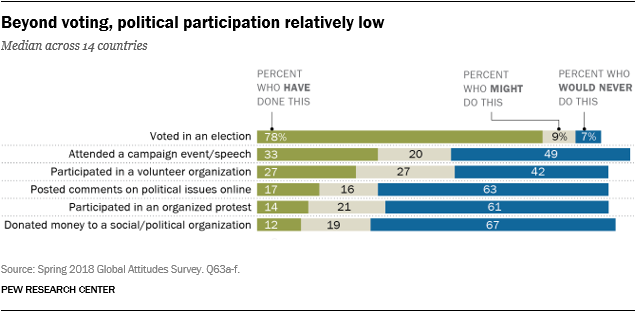Pew Research Center: “Anger at political elites, economic dissatisfaction and anxiety about rapid social changes have fueled political upheaval in regions around the world in recent years. Anti-establishment leaders, parties and movements have emerged on both the right and left of the political spectrum, in some cases challenging fundamental norms and institutions of liberal democracy. Organizations from Freedom House to the Economist Intelligence Unit to V-Demhave documented global declines in the health of democracy.
As previous Pew Research Center surveys have illustrated, ideas at the core of liberal democracy remain popular among global publics, but commitment to democracy can nonetheless be weak. Multiple factors contribute to this lack of commitment, including perceptions about how well democracy is functioning. And as findings from a new Pew Research Center survey show, views about the performance of democratic systems are decidedly negative in many nations. Across 27 countries polled, a median of 51% are dissatisfied with how democracy is working in their country; just 45% are satisfied.
Assessments of how well democracy is working vary considerably across nations. In Europe, for example, more than six-in-ten Swedes and Dutch are satisfied with the current state of democracy, while large majorities in Italy, Spain and Greece are dissatisfied.
To better understand the discontent many feel with democracy, we asked people in the 27 nations studied about a variety of economic, political, social and security issues. The results highlight some key areas of public frustration: Most believe elections bring little change, that politicians are corrupt and out of touch and that courts do not treat people fairly. On the other hand, people are more positive about how well their countries protect free expression, provide economic opportunity and ensure public safety.
We also asked respondents about other topics, such as the state of the economy, immigration and attitudes toward major political parties. And in Europe, we included additional questions about immigrants and refugees, as well as opinions about the European Union….(More)”.


